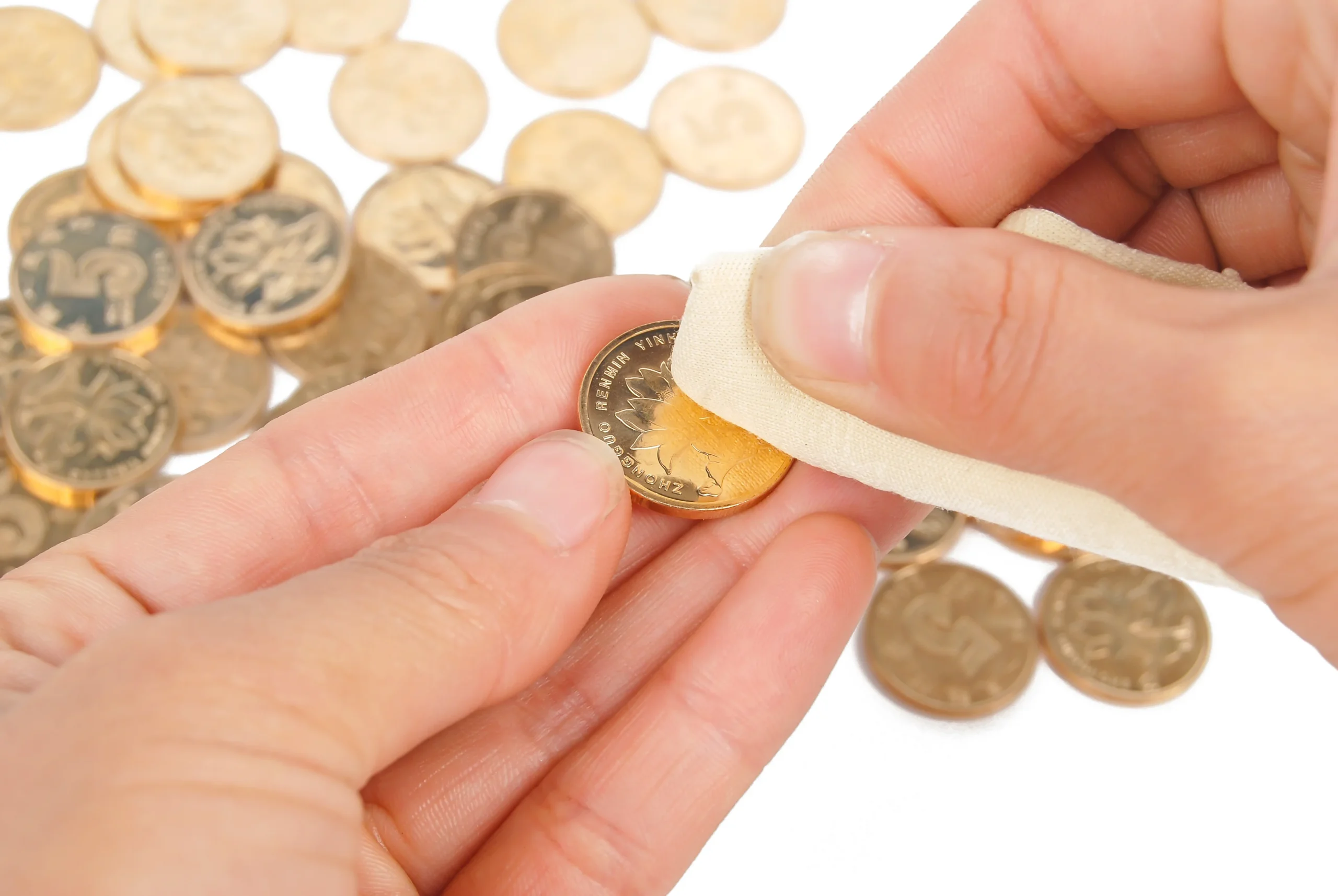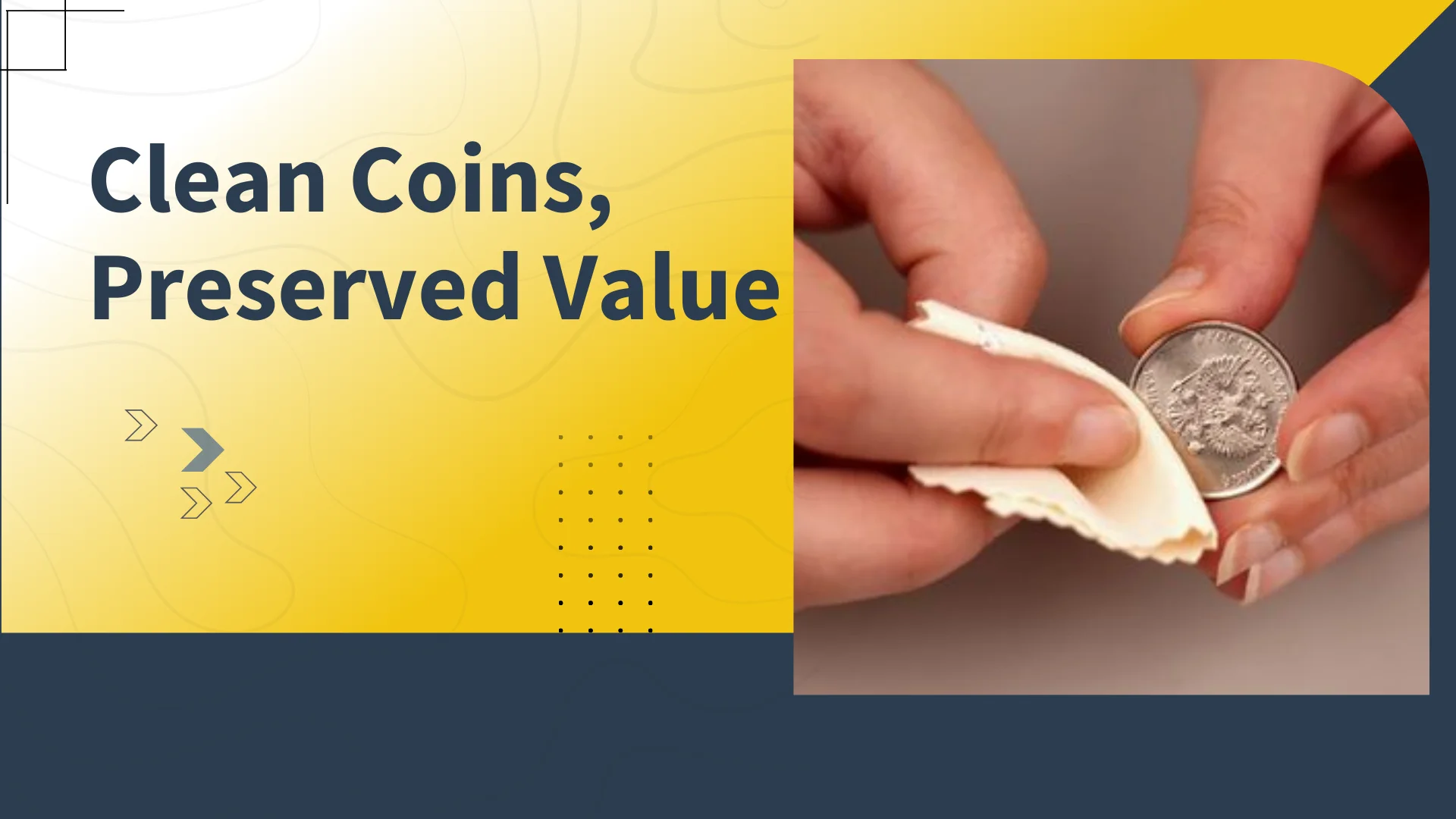Old coins carry stories. Whether you’ve found a dusty jar in your attic or picked up something unusual at a flea market, the question often comes up: “Can I clean this coin without ruining it?”
The short answer? Sometimes yes—but only if you know what you’re doing.
Before you grab the vinegar and start scrubbing, there are important things to understand. Cleaning coins the wrong way can scrape away their history and destroy their worth. But when done right—and only on the right kinds of coins—you can safely bring back their shine.
Let’s walk through when to clean old coins, how to do it safely, and which cleaning methods actually work.
When You Shouldn’t Clean a Coin
Let’s start with the biggest mistake collectors make: cleaning coins that should never be touched.
If your coin is potentially rare, old, or collectible, it’s best to leave it as is. Coin collectors—and appraisers—prefer coins in their natural state. Even a bit of dirt or tarnish can be better than visible scratches or polish marks.
Before doing anything, ask yourself:
- Is the coin old or unusual?
- Was it passed down in the family or found in a collection?
- Is it a coin with historical value?
If you’re unsure, the best move is to have it professionally appraised. Cleaning a coin like a Morgan Silver Dollar, an early U.S. cent, or a colonial coin can reduce its value significantly if not done properly.
When It’s Okay to Clean Old Coins
Cleaning coins can make sense if:
- The coin has no collectible or resale value
- It’s heavily soiled or has built-up grime
- You’re using it for crafts, displays, or just personal fun
In these cases, the goal isn’t to restore a rare treasure—but to tidy up pocket change or visually enhance lower-value coins.
What You’ll Need for Safe Coin Cleaning at Home
Basic supplies for home cleaning methods:
- Distilled white vinegar or lemon juice
- Table salt
- Baking soda
- Warm water
- Dish soap (mild)
- Soft toothbrush or cotton swabs
- Plastic container (never metal)
- Soft cloth or paper towels
- Gloves (optional but recommended)

Clean Coins at Home: Step-by-Step Guide
Here are some tried-and-true cleaning methods you can use on non-collectible coins. Choose the one that fits your coin type.
1. Vinegar and Salt Soak
This method works well for copper coins and general surface grime.
Steps:
- Mix 1 cup of white vinegar with 1 tablespoon of salt. Stir until salt is dissolved.
- Pour the mixture into a plastic container.
- Lay the coins flat in a single layer. Make sure they’re fully submerged.
- Let them soak for 10–15 minutes.
- Remove and gently wipe with a cloth. If dirt remains, repeat the soak or use a soft toothbrush to scrub lightly.
- Rinse with warm water and dry completely.
2. Baking Soda Paste
Baking soda acts as a mild abrasive, good for lifting stains without scratching the metal.
Steps:
- Mix a spoonful of baking soda with just enough water to make a paste.
- Rub the paste onto the coin using a soft toothbrush or fingers.
- Rinse under warm water and dry.
This works best for coins made of copper or clad materials.
3. Dish Soap and Warm Water
For coins that aren’t heavily tarnished, a gentle soap wash might be enough.
Steps:
- Fill a container with warm water and a small drop of dish soap.
- Place coins in the soapy water and let them sit for a few minutes.
- Rub gently with a soft brush.
- Rinse and dry with a lint-free cloth.
This method is ideal for general cleaning without risking surface damage.
4. Distilled Water Soak (Best for Ancient or Copper Coins)
Tap water contains minerals and chemicals that could cause further corrosion. Use distilled water when cleaning fragile or corroded coins.
Steps:
- Place coins in a bowl of hot distilled water.
- Let them soak overnight.
- Gently pat dry in the morning.
This slow method is safest for very old or corroded copper coins that need special care.
5. Electrochemical Method for Silver Coins
This method is best used on tarnished silver coins—not rare or valuable ones.
You’ll need:
- Aluminum foil
- Baking soda
- Hot water
Steps:
- Line a bowl with foil, shiny side up.
- Place coins on top of the foil.
- Sprinkle baking soda generously over them.
- Pour in hot water to cover the coins.
- Wait a few minutes, then rinse and dry.
The reaction between the foil, baking soda, and water pulls tarnish off the coin’s surface.
6. Hydrogen Peroxide (For Dirt and Germs Only)
Peroxide can help sterilize coins and lift surface grime. It’s not a polish, and it won’t remove oxidation.
Steps:
- Place coins in a bowl and cover with hydrogen peroxide.
- Let sit for up to 24 hours.
- Rinse thoroughly and dry.
Do not use this on collectible or high-value coins.
Cleaning by Coin Type
Here’s a quick breakdown of what to use based on the coin metal:
Coin Type | Best Cleaning Method |
Copper | Distilled water soak or vinegar solution |
Silver | Baking soda and foil method |
Nickel-clad | Soap and water or baking soda |
Bronze | Vinegar with care; distilled water safest |
What NOT to Use When Cleaning Coins
To protect your coins, never use:
- Metal polish or abrasives: These can scratch or strip the surface.
- Bleach or acid dips: Dangerous to you and harmful to coins.
- Toothpaste: Despite what some say, it’s too abrasive.
- Ketchup or soda for too long: Acidic ingredients can corrode metal.
How to Handle and Store Coins After Cleaning
Once clean, how you store your coins matters just as much.
- Always handle by the edges, never the face.
- Use gloves to avoid skin oils transferring to the coin.
- Store coins in acid-free, PVC-free holders to prevent further damage.
- Avoid humidity and temperature swings by keeping them in a cool, dry place.
Final Thoughts on Coin Cleaning
Cleaning coins can be a rewarding experience when done correctly and on appropriate coins. The satisfaction of revealing a coin’s hidden details and restoring its beauty is undeniable. However, this should always be balanced with respect for the coin’s history and potential value.
For common coins, gentle cleaning can enhance your enjoyment and appreciation. For potentially valuable coins, preservation should be your priority—and that often means leaving them in their current state, patina and all.
Expert Help from Mountain View US and Foreign Coins
If you’re uncertain about whether to clean your coins or need professional advice, Mountain View US and Foreign Coins is here to help. As your trusted local coin dealer serving the San Francisco Bay Area for over a decade, we offer expert guidance on coin cleaning, preservation, and valuation.
Visit us to discover how we can help you preserve and enhance your coin collection. Our team of numismatic experts can provide personalized advice for your specific coins—whether they’re family heirlooms or recent discoveries.
Remember: When it comes to coin cleaning, less is often more. Preserve history first, and clean only when absolutely necessary.

